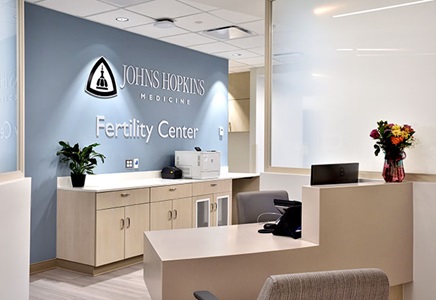Advanced Maternal Age
Featured Expert
It’s becoming more and more common for people to delay getting pregnant until later in life, but what is the impact of waiting to have children? Many couples over age 35 who are trying to conceive will experience issues with fertility and, once they become pregnant, are at a higher risk for certain complications. Fortunately, there are steps you can take to help plan your pregnancy and reduce the risk of complications.
What You Need to Know
- Fertility begins to gradually decrease at about age 35, with a more rapid decline around 37.
- Becoming pregnant later in life can include an increased risk of miscarriage, gestational diabetes, fetal chromosomal abnormalities, preterm birth and stillbirth.
- There are some benefits to getting pregnant later in life. Studies have shown that people who are older when they give birth are likely to live longer, for example.
- Fertility specialists can help with a variety of patient needs, from pregnancy planning and genetic testing to egg freezing.
What is advanced maternal age?
Advanced maternal age, or geriatric pregnancy, refers to people who become pregnant at age 35 or older. The majority of healthy people who get pregnant in their late 30s, and even into their early 40s, have healthy babies, but “age is one of the most important factors in fertility,” says Vasiliki Moragianni, a reproductive endocrinologist and infertility specialist with the Johns Hopkins Fertility Center. “Your overall health, habits and medical history can impact your likelihood of becoming pregnant at any age. Fertility factors are really specific to each individual, which is why it can be helpful to consult a fertility expert when trying to conceive.”
The Johns Hopkins Fertility Center

How does age affect fertility?
Fertility begins to gradually decrease at about age 35, with a more rapid decline around 37. People with a uterus are born with all of the eggs their body will ever have, which usually numbers in the millions to start with. As you age, both the quantity and the quality of your eggs decreases, making it less likely to have a successful pregnancy. By age 45, pregnancy is highly unlikely, but still possible, until your menstrual cycle officially ends and menopause begins.
Risk Factors for Advanced Maternal Age
There are additional risk factors associated with becoming pregnant later in life. These can include an increased risk of:
- Miscarriage: Miscarriages, which occur in 10% to 30% of all pregnancies (and maybe more frequently), are usually due to genetic or chromosomal abnormalities when they happen early in pregnancy. Fetal chromosomal abnormalities are more common with advanced maternal age.
- Gestational diabetes: The risk of gestational diabetes, a type of diabetes specific to pregnancy, begins to increase after age 25.
- Fetal chromosomal abnormalities: Genetic conditions like Down syndrome may be more common as the quality of eggs decreases with age. “The eggs you’re born with are naturally paused in the process of dividing their DNA,” Moragianni explains. “They complete that process, or ripen, when you ovulate them 20 to 40 years later. The longer eggs are stuck in the mid-division stage, the more likely that process will go wrong — creating eggs with the wrong number of chromosomes. That results in not becoming pregnant, experiencing miscarriages or having babies with genetic syndromes due to chromosomal abnormalities.”
- Cesarean delivery: Older mothers are at a higher risk of complications that may necessitate a C-section birth, but vaginal delivery is still the most common route of delivery after age 35. It can also depend on the health and personal preferences of the mother.
- Preterm birth: Preterm labor occurs more often for older mothers, but there are several reasons why a preterm birth may be medically necessary. Giving birth prior to full-term development can mean a low birth weight and other increased health risks to the baby.
- Stillbirth: The risk of stillbirth remains low, but becomes higher with age.
Some risks don’t increase until after age 40, including increased risk for preeclampsia (high blood pressure during pregnancy or directly after childbirth). Increased risk factors can also depend on the mother’s overall health. For example, you are more likely to develop high blood pressure as you age, and if you already have high blood pressure, your risk of developing additional symptoms from preeclampsia is much higher.
Multiple pregnancy, or carrying more than one baby at a time, is also more likely to occur with advanced maternal age. This can be because you are more likely to ovulate two eggs at once as you get older, but it also more commonly occurs with pregnancy through in vitro fertilization (IVF).
Any pregnancy can experience complications. Some of the more common pregnancy complications include bleeding, miscarriage or amniotic fluid complications.
Benefits of Advanced Maternal Age
There are also some benefits to getting pregnant later in life, besides waiting until you feel you are ready. Studies have shown that people who are older when they give birth are likely to live longer. They also trend toward having a higher income and more education than younger parents, which can allow them to provide more opportunities to their children in those early stages of development.
What are the chances of getting pregnant at 35 and older?
Healthy couples in their 20s and early 30s typically have a 25% chance of becoming pregnant during a single menstrual cycle. These odds gradually decrease to a less than 10% chance by age 40.
“The vast majority of people will become pregnant within the first 12 months of trying to conceive with regular unprotected intercourse,” Moragianni says.
When to See a Fertility Specialist
Fertility specialists can help with a variety of patient needs, from pregnancy planning and genetic testing to egg freezing. If you are struggling to conceive or know that you have an existing medical problem that may make it harder to get pregnant, you should seek consultation with a fertility specialist.
Moragianni recommends that couples come in for an infertility evaluation after six months of trying if they are over the age of 35.
Fertility Consultations Prior to Pregnancy
If you are thinking about trying to become pregnant, start by making an appointment with your Gyn/Ob doctor for a health exam. There are vitamins, vaccines and other prenatal care tips that your gynecologist can offer to help provide the best chance for conception and staying healthy while pregnant. Early and regular prenatal care is very important for a successful pregnancy, especially if you are higher risk because of age. Your doctor can also assist with calculating your monthly fertility window so you know the optimal time to have sex to conceive.
A fertility specialist can go even further by working with you to craft a reproductive life plan. “We’re thinking about more than just your current pregnancy,” says Moragianni, “but also your overall health, infertility factors that may prevent conception, your options for genetic counseling, your wants and needs with this pregnancy and also your desires with future pregnancies you may wish to have. Our goal is to provide all available options so that you can make the right choices for you and your family, both for now and for later.”
Preserving Fertility
What if you aren’t ready to have children, but you want children in the future? There is no technique that can guarantee future fertility, but IVF combined with egg or embryo freezing may be one option to help preserve your fertility for the future. The combination allows you to preserve better-quality eggs, have them fertilized in a lab, and then implanted when you are ready to have children.
Fertility preservation can also be a good option for patients with gynecologic cancer who are about to undergo surgical treatment, or for transgender people undergoing gender affirmation surgery who wish to have children after completing their treatment.
The Fertility Preservation and Innovation Center

How does age affect recovery after birth?
Your provider may recommend that you give birth at 39 weeks to reduce the risk of complications. If you have not already delivered, your labor will likely be induced at that time. Maternal mortality is rare, but it is higher for women 40 and older within six weeks after giving birth. It’s important to prioritize postpartum care, including follow-up visits with your provider, within the first three weeks after delivery. These visits ensure that both mother and baby are recovering well.
High-risk patients are encouraged to check in with their provider sooner, usually within the first one to two weeks after delivery. If you experience any of the following, seek medical care immediately:
- Dizziness
- Shortness of breath
- Fever and/or chills
- Bright, brisk bleeding







